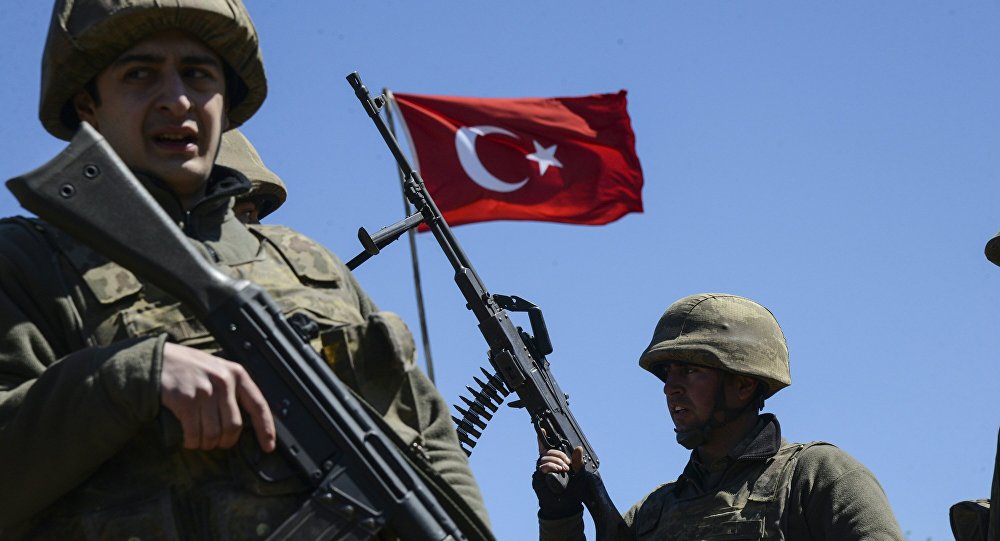(AhlulBayt News Agency) - After Syrian army forces liberated Aleppo from anti-Damascus forces and their regional backers, the competition between the major relevant sides of the conflict has shifted to capturing the Al-Bab town. Located in northern Syria, Al-Bab is of a strategic significance for Turkey, the opposition armed groups loyal to Ankara, the Kurds, and the Syrian military. Its control was seized by ISIS terrorists in January 2014. The Syrian town is only 30 kilometers away from the Turkish borders. According to the initial plans, the Turkey-led Operation Euphrates Shield aims at pushing back ISIS terrorists from the town and granting it control to forces of the opposition Free Syrian Army (FSA).
On December 23, 2016, President Recep Tayyip Erdogan of Turkey announced that the Turkish military forces were soon to launch an assault against ISIS in Al-Bab in a bid to fully wrest control of the town from the terror group. But soon after Erdogan's announcement, ISIS' self-style news agency Amaq reported that some Turkish special forces that moved to dominate the Al-Farough Hospital, located in west of Al-Bab, fled the fighting scene and left behind armored vehicles and other military equipment after they faced resistance and suicide attacks by ISIS militants. The news outlet maintained that the ISIS forces seized two tanks, an armored vehicle, a bulldozer, and some more military equipment belonging to Turkey’s military. Then, ISIS published a video apparently displaying two Turkish army captives being burned alive by the terrorist group. This scale of losses has been unprecedented and worst experience the Turkish forces sustained within a single day since their intrusion to the northern Syria in August 2016.
Certainly, the loss of the well-equipped forces of the Turkish military, while it is branded world’s fourth and NATO’s second most powerful military, is a heavy blow to Turkey’s international image of counterterrorist fighting in Syria and Iraq. Following launching the operation to reclaim Mosul by the Iraqi army and the Public Mobilization Forces (PMF), Erdogan argued that the Turkish forces will join the campaign even in case the Iraqi government and people protested the move.
The severe consequences of the Turkish loss become clearer if we compare the weak performance of Turkey’s military and its losses in Al-Bab battle to the sweeping gains of the Syrian army and the Resistance camp's forces, including retaking Palmyra and Aleppo from a wider and more diversified coalition of anti-Damascus forces like ISIS. As a further comparison, the Iraqi military forces pushed ISIS out of Al Anbar province and additionally managed to free more ISIS-held territories in Nineveh province without support from other countries' ground forces. They blocked escape routes of the terrorists from Mosul to Syria to move effectively to obliterate terrorism in the region.
Many analysts believe that after the Turkish failed coup bid on July 15, 2016, Turkey lost its top navy, air force, and ground force commanders, an issue that sent the country’s army severely weakened. Anyway, it is apparent that the Turkish forces failed to make advances toward Al-Bab’s center. Such a failure pushed the Turks to urge the Russian airstrikes for support in their anti-ISIS fight. The key drive behind Ankara’s call for Russia air cover is described to be Erdogan’s concerns about the consequences of a massive bombing of Al-Bab town to apply the “scorched-earth policy”, which will lead to civilian losses that in turn will trigger possible Syrian government’s response using S-300 and S-400 air defense systems. When in May 2016, the Turkish fighter jets targeted a village in the vicinity of Al-Bab and killed dozens of the civilians, the Syrian military issued a statement, warning the Turkish planes against repetition of such air raids on Syria’s territories. The scenario becomes worse for Ankara when coordination between Damascus and the Kurds is agreed upon, as media have recently talked about cooperation between the Syrian government’s forces and the Kurdish groups in some of Al-Bab's villages.
On the other side, calling on Russia for help is indicative of degree of Turkey’s discontent with Washington due to the latter's backing for the Syrian Kurdish militant groups. In fact, Ankara leaders use closeness to Moscow to press Washington for reviewing the current approach of dealing with the Kurds. After word spread that Turkey asked Russia for support to its military campaign in Syria, Peter Cook, the Pentagon press secretary, said that the US worked with Ankara on striking ISIS. He added that the US government backed the Turkish operations that are launched against ISIS militants and in support of the Syrian opposition armed groups known as Free Syrian Army (FSA).
Although the reports suggest that Moscow accepted offering support for the Turkish forces in northern Syria under the condition of allowing the Syrian forces to control Al-Bab, the recent Moscow-Ankara deal shows the Turkey-backed FSA to be preparing to launch massive offensive to retake Al-Bab from ISIS. Fahim Isa, the commander of the Turkmen Sultan Murad Division, has told the Turkish Anadolu news agency that his forces will move to Manbij as their next station once they capture Al-Bab. Turkey’s Erdogan even moved beyond, announcing that the operation will not stop after Al-Bab control, and will continue toward Raqqa, the self-proclaimed ISIS capital in Syria.
/298
source : Alwaght
Saturday
7 January 2017
11:26:35 AM
803296

After Syrian army forces liberated Aleppo from anti-Damascus forces and their regional backers, the competition between the major relevant sides of the conflict has shifted to capturing the Al-Bab town.
